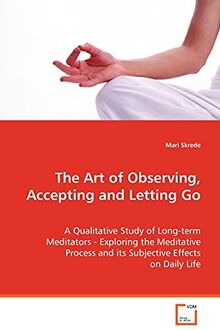
Meditation is an ancient practice used to transform
consciousness by altering attention, and it has
gained ground in the western world during the last
century. This book explores and describes meditation
and its subjective consequences from the viewpoint of
six long-term meditators. These consequences are
hypothesized to be the outcome of the dissolution of
the constructed and conditioned self. From observing,
accepting and letting go of earlier conditioning a
new awareness arises in the meditator who now
conceives the world and existence from an expanded
point of view, devoid of the notion of duality. The
analysis of the qualitative interviews in relation to
different theoretical perspectives on the self shows
that the most essential effect of meditation is the
increased flexibility of behaviour, emotions and
thoughts, in addition to spiritual harmony. These
effects can be considered a result of the
transformation of the self, facilitated by meditative
practice. This study should be interesting for anyone
fascinated by meditation, psychology and
alternative views of the human self and existence.